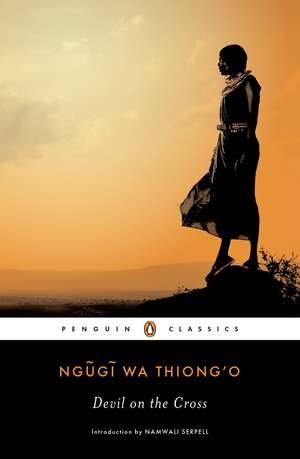Devil on the Cross
Autor Ngugi wa Thiong'oen Limba Engleză Paperback – 27 sep 2017
Written on toilet paper while Ngugi wa Thiong'o was in prison, this novel tells the tragic story of Wariinga, a young woman who moves from a rural Kenyan town to the capital, Nairobi, only to be exploited by her boss and later a corrupt businessman. As Wariinga struggles to survive, she begins to realize that her problems are only symptoms of a larger societal malaise and that much of the misfortune stems from the Western, capitalist influences on her country. Climaxing in an unforgettable scene of the 'Devil's Feast', a satirical parable on Western culture and business practices,Devil on the Crossis an essential story of the post-colonial African experience.
Preț: 69.69 lei
Nou
Puncte Express: 105
Preț estimativ în valută:
13.34€ • 13.89$ • 11.27£
13.34€ • 13.89$ • 11.27£
Carte disponibilă
Livrare economică 17 februarie-03 martie
Livrare express 31 ianuarie-06 februarie pentru 19.32 lei
Preluare comenzi: 021 569.72.76
Specificații
ISBN-13: 9780143107361
ISBN-10: 0143107364
Pagini: 272
Dimensiuni: 130 x 196 x 12 mm
Greutate: 0.23 kg
Editura: Penguin Books
Colecția Penguin Classics
Locul publicării:London, United Kingdom
ISBN-10: 0143107364
Pagini: 272
Dimensiuni: 130 x 196 x 12 mm
Greutate: 0.23 kg
Editura: Penguin Books
Colecția Penguin Classics
Locul publicării:London, United Kingdom
Notă biografică
Ngugi
wa
Thiong'o
is
an
award-winning
novelist,
playwright,
and
essayist
from
Kenya
whose
novels
have
been
translated
into
more
than
thirty
languages.
He
lives
in
Irvine,
California,
where
he
is
Distinguished
Professor
of
English
and
Comparative
Literature
at
the
University
of
California,
Irvine.
Recenzii
One
of
our
century's
great
novels
Ngugi is the most celebrated of African novelists. What he offers is nothing less than a new
direction for African writing
Ngugi is the most celebrated of African novelists. What he offers is nothing less than a new
direction for African writing
